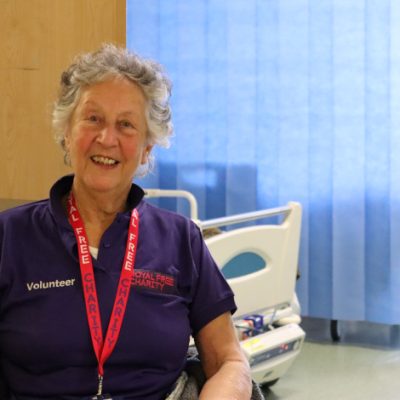 In 2021, Kay Graham’s leg was amputated as part of life-saving treatment for an abdominal aortic aneurysm. Now she volunteers at the Royal Free Hospital helping new amputees to navigate life once they leave the wards.
In 2021, Kay Graham’s leg was amputated as part of life-saving treatment for an abdominal aortic aneurysm. Now she volunteers at the Royal Free Hospital helping new amputees to navigate life once they leave the wards.
Kay’s amputation was unexpected. She was on a Zoom call with her local theatre group when they noticed that she had slipped out of her chair. They acted fast, calling an ambulance and her neighbour to help.
Kay was treated at the Royal Free Hospital and had a six-hour operation on her aorta. The swift action from her friends saved her life but a lack of blood supply to her leg meant it needed to be amputated.
Kay’s recovery meant accessing lots of different services in different parts of London, which showed her how complex the system can be. She said: “In the NHS there are lots of very good people, but sometimes a lack of joined-up thinking and that is where I feel I can help.
“Doctors understand your clinical needs, and nurses can talk to you about wound recovery, and physiotherapists will help you get your movement back, but each of them don’t really know about what stage is next in the system, what happens next, how do you cope once you are home?”
Kay accessed the Royal Free Charity support hub’s amputee support group while in hospital. The group meets online fortnightly for patients who are still on the hospital’s wards, those further into recovery, and the support hub’s own welfare advisors.
Kay attends the group to offer advice to amputees who are just starting to navigate life after amputation: “I want to reassure people that an amputation is not the end of normal life. With help, and a fair amount of stubbornness, one can get all sorts of help. I try to explain what happens when you leave the hospital, how you get your prosthetic and how to access help from the local authority.”
As well as attending a support group, Kay visits the wards on a regular basis: “If you aren’t physically on the ward, it is easy to miss people and we want to be able to point them towards the support group, or anything else they might need.”
Karlene Campbell-Fearon, ward sister, is grateful for the perspective that Kay’s experience can bring:
“As staff we can try to encourage our amputee patients, but it is more accepted when someone who has had the experience explains to them what to expect. All the patients visited by her have given positive feedback and all the staff are really grateful.”
